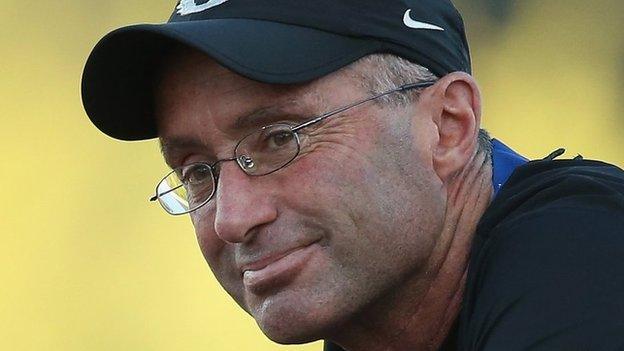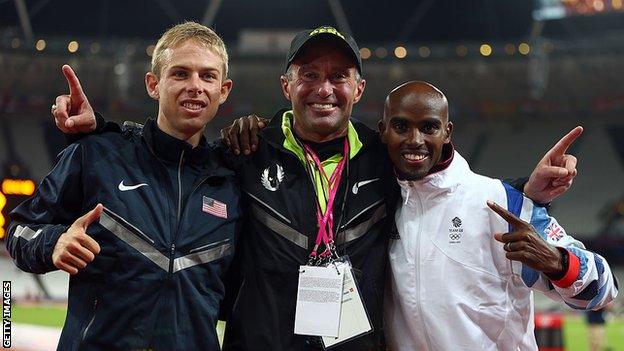Alberto Salazar: Concerns over medications for Mo Farah 'dated back to 2011'
- Published

Salazar is appealing against a four-year ban for doping violations
UK Athletics officials had concerns about banned former Nike Oregon Project coach Alberto Salazar's use of medications with Mo Farah as early as July 2011, documents reveal.
A senior UKA doctor remarked at the time: "Wonder how much other medical stuff [Salazar] may drive and not keep us informed."
UK Athletics said any concerns about four-time Olympic champion Farah's medication were addressed when head of endurance Barry Fudge took over in July 2011 as liaison between the Oregon Project and UKA.
Emails obtained by Panorama also suggest UK athletes based in the US were asking UKA doctors about thyroid medication for "performance gains" because "the Americans" were taking it.
UKA medic Dr Noel Pollock wrote that thyroid medication was "well used by Alberto's group".
Farah, who won gold in the 5,000m and 10,000m at the London 2012 and Rio 2016 Olympics, has always denied using thyroid medication, and is not accused of breaking anti-doping rules.
The development comes days after a Panorama programme revealed the 36-year-old had repeatedly denied to a US Anti-Doping investigator having injections of the legal supplement L-carnitine, despite having done so. He later changed his account, saying he forgot.
Farah was coached by Salazar at the Nike Oregon Project from 2011 to 2017.
Salazar was first accused of breaking anti-doping rules in 2015 in a BBC Panorama programme, and was banned from the sport for four years in 2019.
'That's concerning re Mo and Alberto'
In a series of emails about Farah's medical care in July 2011, Dr John Rogers, then medical officer to UKA, alerted colleagues that Salazar had put Farah on high doses of iron. Dr Rogers said he had discussed the "dangers of iron overload".
In response, Dr Pollock, then a senior medical doctor in UKA, wrote: "That's concerning re Mo and Alberto…wonder how much other medical stuff [Salazar] may drive and not keep us informed. Potential for issues re injury presentation when things not going well too."
Dr Rogers gave evidence to the Department of Culture, Media and Sport committee in 2017 about similar concerns over iron and other medication being given to Farah.
Dr Pollock is now UKA's chief medical officer.
UK Athletics told the BBC: "Any concerns relating to Sir Mo Farah and medication oversight were addressed in July 2011 when Dr Barry Fudge took over liaison between Mo's medical treatment at the NOP and UKA medical personnel."
Salazar, who is appealing against his ban, says: "Any medication taken was done so on the advice and under the supervision of registered medical professionals and in accordance with the methods prescribed by these medical professionals."
It is not clear whether this information was made available to the UK Athletics review team which was investigating Panorama's allegations in 2015. That review found "no reason to be concerned" with Salazar continuing to coach Farah.
UK Athletics added it had appointed "a QC-led review to look at how the organisation responded to the Nike Oregon Project issues in 2015 and 2017, the recommendations made at the time."

Salazar (centre) alongside Farah (right) and training partner Galen Rupp (left) at the London 2012 Olympics
'Why are we not doing it and the Americans are?'
Other emails give an insight into questions over thyroid medication being used to boost performance, and that UKA knew this was being utilised by some in Salazar's group.
In February 2011, just weeks after Farah moved to Nike Oregon Project, Dr Pollock wrote to a medical colleague, then at the British Olympic Association: "I've had a number of recent queries from several endurance athletes who are based in various US camps for low dose thyroxine for performance gain.
"Although not on the [banned] list and I'm not sure if this is performance enhancing but …[it's] ethically dubious and as from a number of sources I thought I'd let you know.
"I'm pretty sure it's not something I want to be involved with but I know it's only a matter of time before I get specifically requested and asked why are we not doing [it] and the Americans are!"
Dr Richard Budgett responded: "Thanks for the heads up. It's on the radar and a concern. Keeping under review."
Dr Pollock added that thyroid medication was "well used in Alberto's group and Mo has just gone to join up with them. Nothing yet brought to Mo but I've asked him to keep me posted".
There is no suggestion Farah ever used thyroid drugs. Several other members of the Nike Oregon Project were given thyroid medication by Salazar and Nike paid-endocrinologist, Dr Jeffrey Brown.
Toni Minichiello, former coach to Olympic champion Jessica Ennis-Hill, has been raising concerns about potential misuse of thyroid medication.
"I've presented my concerns about use of thyroid medication with the board of UK Athletics and it's now up to them what they do," he said.
Salazar told Panorama last week that no Oregon Project athlete had ever used medication against the spirit of the rules.
L-carnitine not 'batch-tested'
The BBC can also reveal that the L-carnitine provided to Farah in 2014 was not "batch-tested" as UKA first claimed.
Last week UK Athletics told Panorama that the reason head of endurance Barry Fudge flew to Switzerland was because batch tested L-carnitine was not available in the UK.
Batch-tested supplements minimise the risk of contamination. UKA said that Salazar had assisted in locating the batch tested L-carnitine, and that Fudge travelled to Switzerland to collect it.
Informed Sport is a quality assurance programme that published an approved list of supplements that they exhaustively test to ensure they are as safe as possible for athletes.
UKAD advice is that athletes should take "all steps to minimise the risk [of contamination] including using a batch-tested service such as Informed Sport."
However, the BBC has established that the L-carnitine which Fudge obtained in Switzerland has never been on the Informed Sport approved list, and asked UKA to provide evidence the substance had been batch-tested.
Following the BBC's enquiry, UKA has now changed its position, saying its initial position was "not entirely correct".
A UKA spokesperson said: "The L-Carnitine provided to Sir Mo Farah in 2014 was a pharma grade product.
"By definition, it was therefore prepared and manufactured to standards that reduce any risk of contamination to the maximum possible extent. Pharma grade products are in fact regarded as even safer from contamination than batch-tested supplements listed on Informed Sport."